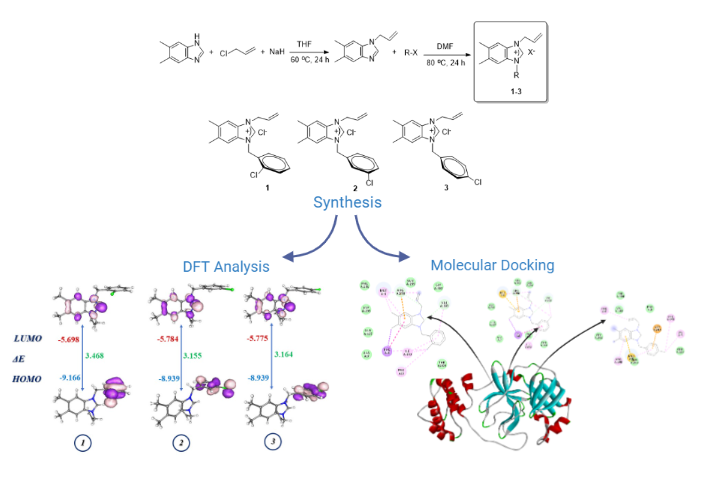Synthesis, and Characterization and In-Silico Analysis Against SARS CoV-2 of Novel Benzimidazolium Salts

- Benzimidazolium,
- DFT,
- Molecular Docking,
- N-Heterocyclic Carbenes,
- SARS CoV-2
Copyright (c) 2022 Orbital: The Electronic Journal of Chemistry

This work is licensed under a Creative Commons Attribution-NonCommercial-NoDerivatives 4.0 International License.
Abstract
N-heterocyclic carbene molecules are often used as the main scaffold in pharmaceutical chemistry, and one of the most important of these is benzimidazoles. Severe Acute Respiratory Syndrome Coronavirus Disease-2 is the cause of the ongoing pandemic, and a drug should be developed against this virus. Scientists have been investigated the antiviral effects of many not only known molecules but also new molecules. In this study, reactivity and anti-coronavirus disease properties of new benzimidazole derivative molecules were investigated by theoretical methods. Three new benzimidazole derivative molecules were synthesized and fully characterized by FT-IR, 1H NMR and, 13C{1H} NMR spectroscopies for this purpose. Density Functional Theory-based calculation methods were used for optimization and frontier orbitals analysis. Also, the interactions of the molecules were evaluated with coronavirus disease main protease, and severe acute respiratory syndrome coronavirus main peptidase and the results were compared with the results of well-known anti-viral drugs by molecular docking methods. According to the results, 1-allyl-3-(3-chlorobenzyl-5,6-dimethylbenzimidazolium chloride represent the best result against both main protease and main peptidase enzyme with -6.36 kcal/mol and -8.87 kcal/mol, respectively. Additionally, three of the molecules were give better binding results than the well-known anti-viral drugs.





